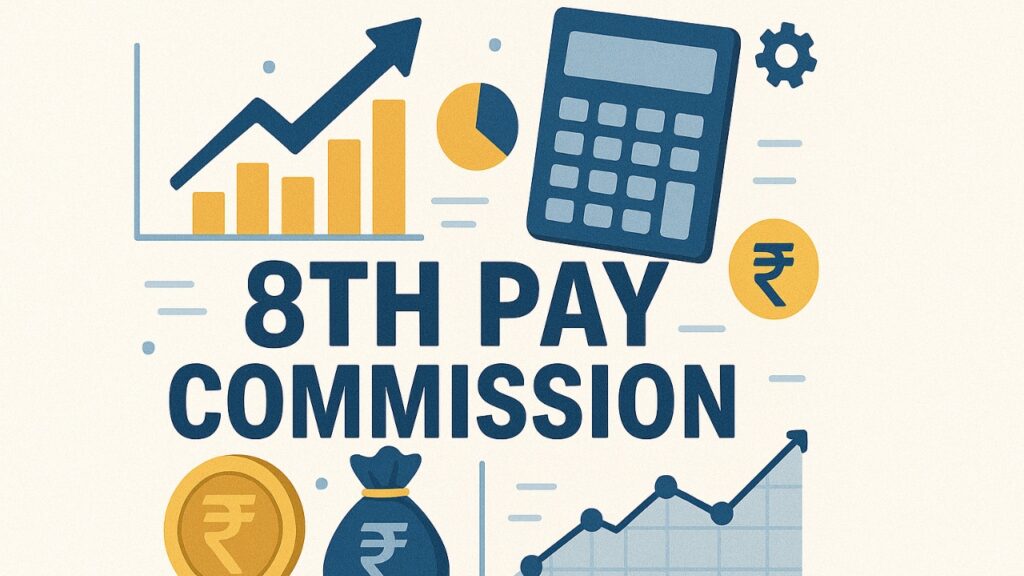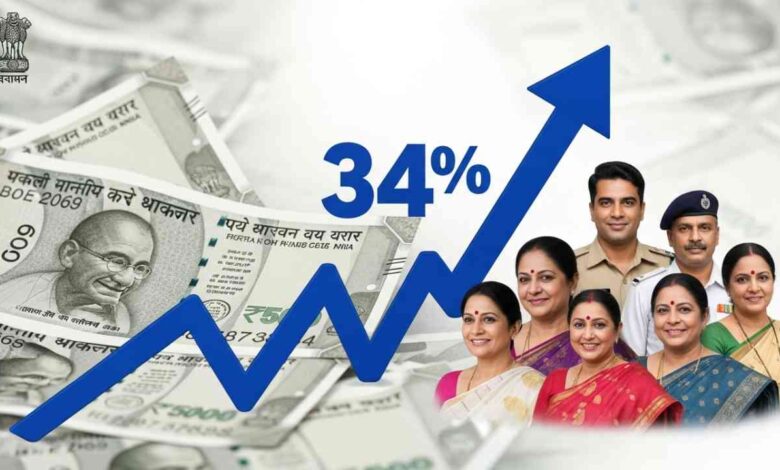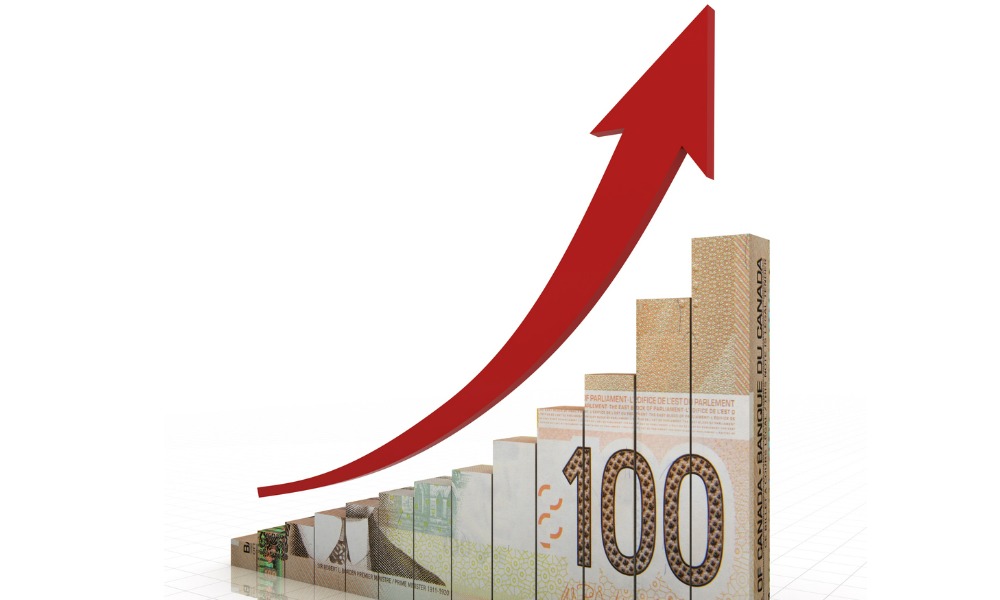“8th Pay Commission 2027: Latest Salary Hike, Fitment Factor, Basic Pay Increase, and Implementation Date for Central Government Employees” 8th Pay Commission 2027, Salary Hike, Fitment Factor, Basic Pay Increase, Implementation Date, Central Government Employees, Allowances, Pension, and Comparison. Discover the latest updates on the 8th Pay Commission 2027, including expected salary hike, fitment factor, basic pay increase, implementation date, and benefits for central government employees. Stay informed with the most accurate news, pay matrix details, and pension revisions to rank on top in Google search results. 8th Pay Commission 2027: Complete Guide to Salary Hike, Fitment Factor & Basic Pay Increase for Central Government Employees.
What is the 8th Pay Commission 2027? Key Objectives and Importance

The anticipation around the 8th Pay Commission (8th CPC) is building up among central government employees across India. With the possibility of a substantial salary hike, an increased fitment factor, and a revised basic pay structure, the 8th Pay Commission is poised to bring significant changes to the pay scales and benefits of millions of government workers.
This comprehensive guide covers everything you need to know about the 8th Pay Commission, including expected salary hikes, fitment factor updates, implementation timelines, and how these changes will impact central government employees.
The 8th Pay Commission 2027 is a government-appointed body tasked with reviewing and revising the salary structure, allowances, and pension benefits for central government employees and pensioners. Its recommendations directly impact the financial well-being of over 50 lakh employees and 65 lakh pensioners in India.
- Revise salary structures to reflect current economic conditions and inflation.
- Recommend new fitment factors for calculating basic pay increases.
- Update allowances like Dearness Allowance (DA), House Rent Allowance (HRA), and Travel Allowance (TA).
- Enhance pension benefits for retired government employees.
- Directly affects the income and lifestyle of central government employees.
- Influences the Indian economy by increasing disposable income.
- Plays a crucial role in employee motivation and retention.
What is the 8th Pay Commission?

The Pay Commission is a government-appointed body that reviews and recommends changes to the salary structure, allowances, and other benefits for central government employees and pensioners. The 8th Pay Commission is the next in line after the 7th Pay Commission, which was implemented in 2016. Its recommendations are expected to influence the financial well-being of over 50 lakh central government employees and nearly 65 lakh pensioners.
Why is the 8th Pay Commission Important?

- Direct Impact on Salaries: The recommendations will determine the new basic pay, allowances, and pension structures.
- Economic Influence: Higher salaries can boost consumption and stimulate the economy.
- Employee Morale: Timely and fair pay revisions are crucial for motivation and retention among government staff.
Expected Salary Hike in 8th Pay Commission: Latest Updates for Central Government Employees

The 8th Pay Commission salary hike is highly anticipated, with reports suggesting an increase of 20% to 34% in basic pay for central government employees. The final hike will depend on the fitment factor recommended by the commission.
- Salary hikes are expected to benefit nearly 1 crore employees and pensioners.
- The minimum basic pay could rise from ₹18,000 to as much as ₹51,480, depending on the fitment factor.
- The hike will also affect allowances and pensions.
Basic Salary May Rise to ₹51,480
One of the most talked-about aspects of the 8th Pay Commission is the expected increase in the minimum basic salary. Reports suggest that the current minimum basic pay of ₹18,000 could rise to as much as ₹51,480, subject to government approval and the final fitment factor decided by the commission.
8th Pay Commission Fitment Factor: Calculation, Impact, and Benefits

The fitment factor is a crucial multiplier used to calculate the revised basic salary for central government employees. It ensures a standardized and transparent salary hike during pay commission transitions.
How the Fitment Factor Works:
- Formula: New Basic Pay = Old Basic Pay × Fitment Factor
- The 7th Pay Commission used a fitment factor of 2.57, raising minimum basic pay to ₹18,000.
- For the 8th Pay Commission, the fitment factor is expected to be between 1.92 and 2.86.
Benefits 8th Pay Commission :
- Ensures fair and uniform salary hikes.
- Adjusts for inflation and cost of living.
- Directly impacts allowances and pension calculations.
What is the Fitment Factor?
The fitment factor is a multiplier used to calculate the revised pay from the existing basic pay. For the 8th Pay Commission, it is widely speculated that the fitment factor may be increased to 2.86. This means that the revised basic pay will be 2.86 times the current basic pay, resulting in a significant salary hike for all central government employees.
How Will the 8th Pay Commission Affect Central Govt Employees?

Substantial Salary Increase
With the proposed fitment factor and revised basic pay, central government employees can expect a significant boost in their take-home salaries. This will not only improve their standard of living but also enhance their purchasing power.
Improved Pension Benefits
Pensioners will also benefit from the revised pay structure, as their pensions are recalculated based on the new basic pay and fitment factor. This ensures financial security for retired employees.
Enhanced Allowances
Apart from basic salary, allowances such as Dearness Allowance (DA), House Rent Allowance (HRA), and Travel Allowance (TA) are also expected to be revised upwards, further augmenting the overall compensation package.
Basic Pay Increase in 8th Pay Commission: New Pay Structure Explained

The basic pay increase under the 8th Pay Commission is central to the new pay structure for government employees. This increase is calculated using the fitment factor and is expected to significantly boost the minimum and maximum salaries across all levels.
- The minimum basic pay could rise to between ₹34,560 and ₹51,480.
- The pay matrix will be revised, affecting all pay levels and grades.
- Higher basic pay will also result in increased allowances and pension benefits.
How Basic Pay Increase Works:
- All allowances (DA, HRA, TA) are calculated as a percentage of the new basic pay.
- Pensioners will see a proportional increase in their monthly pension.
Implementation Date of 8th Pay Commission: Timeline and Official Announcements

The 8th Pay Commission is expected to be implemented around 2027. Traditionally, pay commissions are set up every 10 years, and the 7th CPC recommendations were enforced in 2016. Therefore, the timeline aligns with the historical pattern of pay commission implementations.
The implementation date for the 8th Pay Commission is a critical concern for government employees. Although the government has announced the formation of the commission, the exact timeline is still under discussion.
Current Updates of 8th Pay Commission:
- The 8th Pay Commission is expected to be implemented from January 1, 2026, but some reports suggest a possible delay to 2027.
- The commission’s recommendations will be finalized and approved before implementation.
- The new pay structure will be applicable to all central government employees and pensioners from the effective date.
8th Pay Commission 2027- Conclusion
The 8th Pay Commission is set to bring a wave of positive changes for central government employees and pensioners in India. With the expected hike in basic salary, an improved fitment factor, and revised allowances, the financial landscape for government staff is likely to improve significantly. As the implementation date draws closer, staying updated with the latest developments and official announcements will be crucial for all stakeholders.

